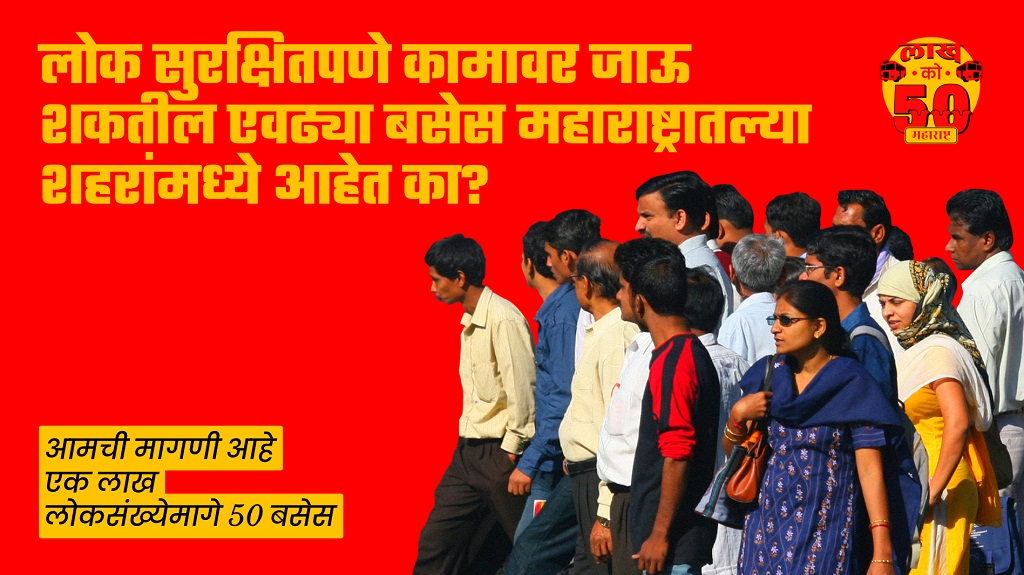Public Transport should be free of taxation: Praveen Pardeshi

Pune, 1 August 2020: Parisar, a Pune-based NGO organized a state-level webinar as part of the Lakhala 50 (Lakh ko Pachaas) the campaign, which is part of a nationwide campaign to demand that both the National and State Governments launch a comprehensive program to ensure that cities are assured a good bus-based public transport system. The campaign highlights the need for at least 50 buses per lakh residents, a benchmark set by the Ministry of Housing and Urban Affairs.
The State campaign for Maharashtra aims to petition the Chief Minister Uddhav Thackeray, calling upon his Government to announce a policy that will make public transport a mandatory service by the 27 Municipal Corporations in the State. Maharashtra is one of the most urbanized states in India, with over 5 crores of its population living in urban areas. Public transport is poor and even non-existent in most of the cities, which have seen explosive growth in vehicles and with it, chronic congestion and pollution.
Parisar had organized city dialogues on buses in Amravati, Nagpur, Pune and Mumbai which highlighted the need for affordable, safe, inclusive and comfortable bus service in the city and the impact the absence of such a service has on the community. The issues of different commuters, as expressed during these dialogues were presented to the panelists and special guest Praveensingh Pardeshi in a video.
In continuation of these dialogues, ‘Take the Bus: A Path to Sustainable Future for Maharashtra’ roundtable was held virtually on Thursday. The webinar witnessed participation from 50 different cities and was viewed by close to 3,000 people on Parisar’s Facebook page. “Maharashtra has only 11 buses per lakh people. To ensure that people go back to work safely maintaining physical distancing norms, Maharashtra needs 22,000 buses,” said SUM Net member Pranjali Deshpande, who started the webinar by presenting the condition of bus systems in Maharashtra.
The diverse panel supported the SUM Net demand at least 50 buses per lakh population and substantiated this claim from varied perspectives. Emphasizing the latent demand of public transport in small cities (with less than 2 million population), Dr Geetam Tiwari talked about the need for smaller buses and their integration with intermediate public transport (auto rickshaws etc) and a strong non-motorized system for smaller cities like Nashik and Amravati. She claimed that this could help achieve a modal share of more
than 20%.
Focusing on the urban governance system and the role of autonomous local government, author and city planner Sulakshana Mahajan talked about the need for dedicated bus lanes and holistic development of the bus ecosystem which includes footpaths, safe crossings and access, etc. “The three F’s- function, functionaries and funds must rest with the local city government”, added Mahajan.
Presenting the operators’ point of view, Prasanna Patwardhan, President of Bus and car Operators Confederation of India (BOCI) underscored the importance of aggressive funding for bus systems just like other big infrastructure projects. Writer and environmental journalist Atul Deulgaonkar expanded the scope of the webinar topic by talking about the role of public transport in mitigating climate change and air pollution, the two biggest threats to mankind. All the panelists extended unequivocal support for the need to shift the focus of planning, perception and design from moving vehicles and specifically private vehicles to moving people, and urged people to sign the public petition which demands strengthening of public buses.
Responding to both the panelists and attendees, Maharashtra additional chief secretary for urban development, Praveensingh Pardeshi advocated for complete removal of taxation on public buses and providing for financial gaps from local sources like local development premiums. “A city bus service runs only when it pays for fuel and its workers,” said Pardeshi and brought the focus on championing innovative ways to reduce the operating costs of buses The campaign has been launched by the Sustainable Urban Mobility Network (SUM Net), a coalition of individuals, voluntary organizations, and civil society networks and movements promoting sustainable urban transport solutions across India.





